|
|
|
Sort Order |
|
|
|
Items / Page
|
|
|
|
|
|
|
| Srl | Item |
| 1 |
ID:
144813
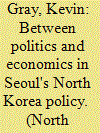

|
|
|
| 2 |
ID:
081216
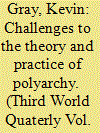

|
|
|
|
|
| Publication |
2008.
|
| Summary/Abstract |
This paper provides an analysis of the development of democracy in Korea since the transition from authoritarianism in 1987, and its implications for critical analyses of Third World democratisation. Accounts of 'low intensity democracy' or 'polyarchy' have noted Third World democratisation for its constrained and elite-centred nature, and as an outcome of US foreign policy, which has sought to demobilise restive popular movements and extend the reach of global capital. However, the Korean general elections of 2004 saw the historic entry of the explicitly socialist Korean Democratic Labour Party (kdlp) into the National Assembly. A re-examination of post-authoritarian politics in fact shows a process of continuous contestation that belies the claims made by the polyarchy literature. Formal democratisation has by its very nature allowed for a counter-movement to be mobilised. The paper also examines the relationship between the kdlp and the mass labour union movement and argues that, while democracy has provided opportunities for participation by previously marginalised social forces, concomitant neoliberal restructuring has limited the development of the mass movements from which such political projects draw their strength. Thus, inquiry into the implications of democratisation for a progressive challenge to neoliberal capitalism must also extend beyond 'politics' to mass movements in the socioeconomic sphere
|
|
|
|
|
|
|
|
|
|
|
|
|
|
|
|
| 3 |
ID:
178135
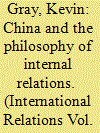

|
|
|
|
|
| Summary/Abstract |
Bieler and Morton’s Global Capitalism, Global War, Global Crisis makes an important and timely contribution to the academic study of the international political economy.1 Based on the philosophy of internal relations, the book seeks to challenge the ‘ontological exteriority’ that is typically posited between key elements of the international system, such as ideas, the social relations of production, the workplace, the ‘social factory’, and the market, state and inter-state system. While the authors draw on a range of theoretical resources and approaches, it is the historical materialism of Antonio Gramsci that provides the key intellectual resource for the numerous theoretical interventions made in the book. For example, Gramsci’s critique of economism and statology provides the basis of an insightful intervention into the structure-agency debate by emphasising the intersections between the social relations of production and class struggle. Gramsci’s theory of hegemony and the integral state, on the other hand, provides the basis of an understanding of the material structure of ideology. As such, Bieler and Morton further strengthen the case for the relevance of Gramsci’s writings not just for the field of International Political Economy but for social theory more broadly.
|
|
|
|
|
|
|
|
|
|
|
|
|
|
|
|
| 4 |
ID:
159153
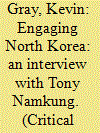

|
|
|
|
|
| Summary/Abstract |
K.A. “Tony” Namkung has been intimately involved for many years in fostering dialogue between the Democratic People’s Republic of Korea (DPRK), the Republic of Korea (ROK), Japan, and the United States. These have included unofficial (Track II) and official discussions, as well as assistance to humanitarian and other not-for-profit organizations working in the DPRK. As part of his efforts, Dr. Namkung has made more than seventy trips to the DPRK. He is currently a member of the National Committee on North Korea (NCNK).
|
|
|
|
|
|
|
|
|
|
|
|
|
|
|
|
| 5 |
ID:
151437


|
|
|
|
|
| Summary/Abstract |
Since the coming to power of Kim Jong Un in 2012, the North Korean government has recently announced, and to some degree has implemented, a new set of economic management policies known as the June 28th measures in 2012 and the May 30th measures in 2014. Both of these sets of measures seek to build upon the abandoned reforms of the early 2000s through restructuring North Korea's highly inefficient collective farm and state-owned enterprise management system. In addition, the government has intensified ongoing efforts at building special economic zones for the purpose of attracting foreign investment. As such, the country is attempting to emulate the reforms adopted by China in the late 1970s. Although the success of these efforts is by no means guaranteed, they do serve to question mainstream analyses that suggest that Juche Self-Reliance or Sŏn'gun Military First Politics ideologies will inhibit any genuine attempt at economic reform in North Korea. We argue, in contrast, that ongoing changes to North Korean state and society mean that, a cyclical stop and start rhythm to the reforms notwithstanding, such attempts at economic reform are likely to continue. However, we also argue that while the contemporary reform drive resembles and may indeed reproduce some of the successes of the Chinese experience, North Korea faces significantly greater challenges, including the greater decline of North Korean industry, local resistance to reform, and the dangers of inflation. Furthermore, North Korea faces a highly challenging external security environment that undermines the ability of the regime to attract investment and by extension the political standing of reformist elements within the country. Given this contrast with the international environment surrounding China's own reform experience, our analysis emphasises the importance of geopolitical context in shaping experiences of economic reform and of development more broadly.
|
|
|
|
|
|
|
|
|
|
|
|
|
|
|
|
| 6 |
ID:
144256
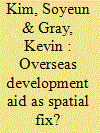

|
|
|
|
|
| Summary/Abstract |
This paper examines the extent to which South Korea’s developmental aid programme to Africa can be understood as a form of ‘aid as imperialism’. We argue against the depiction of a crude determinism between the ‘interests of capital’ and the international activism of the South Korean state through aid provision. Drawing on Harvey’s theory of the new imperialism, we argue that, while the structural transformations in the South Korean political economy explain Seoul’s ODA programme at a general level, it is strongly influenced by geopolitical objectives which often undermine South Korea’s ability to pursue distinctly mercantile aims.
|
|
|
|
|
|
|
|
|
|
|
|
|
|
|
|
| 7 |
ID:
112491
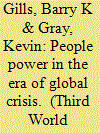

|
|
|
|
|
| Publication |
2012.
|
| Summary/Abstract |
This article examines the relationship between oppression, injustice, and liberation both theoretically and practically and in relation to contemporary global events and political history. The struggle for human freedom and liberation from structures of oppression and exploitation, and the relation to democracy and to the agents of social change, is the central subject of the analysis. The article summarises the critical analyses of the contributors to this collection, who examine the past several decades of `People Power' via popular struggles for substantive democratisation, and assess both the obstacles and achievements of these movements in a context of global, regional, and national political economic tendencies. The authors revisit the theses of `Low Intensity Democracy', which appeared in the early 1990s, in light of the recent upsurge of popular protest and rebellion in the context of an on-going global crisis.
|
|
|
|
|
|
|
|
|
|
|
|
|
|
|
|
| 8 |
ID:
121754
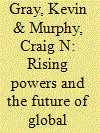

|
|
|
|
|
| Publication |
2013.
|
| Summary/Abstract |
There has been much debate over the extent to which the rising powers of the global South are challenging contemporary global political and economic governance. While some observers see an emancipatory potential in the redistribution of power among states, others see the rising powers as firmly located within the Western-centred neoliberal world order. This collection of papers seeks to go beyond the state-centrism of existing approaches by examining how challenges to global governance by rising powers are rooted in specific state-society configurations. Through studies of Brazil, India, China and other important developing countries within their respective regions, such as Turkey and South Africa, the papers examine the way domestic structures, arrangements, actors and dynamics influence the nature of the international interventions and behaviour of rising powers. They ask how their increased political and economic enmeshment in the international system impacts upon their own internal societal cohesion and development. By examining these issues, the papers raise the question of whether the challenge posed by the rising powers to global governance is likely to lead to an increase in democracy and social justice for the majority of the world's peoples.
|
|
|
|
|
|
|
|
|
|
|
|
|
|
|
|
| 9 |
ID:
144251
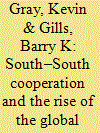

|
|
|
|
|
| Summary/Abstract |
In this introductory article we examine the recent resurgence of South–South cooperation, which has moved once again onto the centre stage of world politics and economics, leading to a renewed interest in its historic promise to transform world order. We provide an overview of contemporary debates surrounding this resurgence, noting in particular the division between those who are optimistic with regard to the potential of Southern economic development and the project of liberation from Northern domination, and the more pessimistic critics, who see this very success of the South as being subsumed within the existing global capitalist development paradigm.
|
|
|
|
|
|
|
|
|
|
|
|
|
|
|
|
| 10 |
ID:
108707
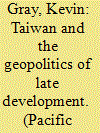

|
|
|
|
|
| Publication |
2011.
|
| Summary/Abstract |
Through a case study of Taiwan, this paper seeks to address recent debates surrounding the transformation of developmental states in East Asia. Whilst a number of authors have cited the Taiwanese state as being both cautious and resilient in the midst of global restructuring, this paper seeks to critically engage with such arguments by highlighting the dynamic and mutually constitutive relations between the forms of social relations that underpin late development and the wider geopolitical system in which such development occurs. Specifically, Taiwanese industrialisation can be viewed as an outcome of the US intervention in the Chinese civil war and subsequent exclusion of China from the regional political economy in the period between the Korean and Vietnam Wars. The Kuomintang (KMT)'s retreat to Taiwan established the basis for the autonomous developmental state, and the US underpinned this state through military protection, aid and access to its own domestic market. However, the relative decline of US hegemony and the readmission of China into the international system have posed significant challenges to Taiwan's developmental state. The US sought to redress its trade imbalance with East Asia by placing pressure on Taiwan to liberalise its political economy. Furthermore, the very process of development itself served to undermine the autonomy of the state as it came under pressure from new social forces. Taiwan has more recently been faced with a dilemma of closer integration with the mainland or the maintenance of its de facto economic and political independence at the risk of becoming isolated from the global trading system.
|
|
|
|
|
|
|
|
|
|
|
|
|
|
|
|
| 11 |
ID:
190797
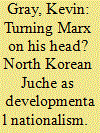

|
|
|
|
|
| Summary/Abstract |
The existing literature on North Korea has been divided over whether the country’s state ideology of Juche should be regarded as a variant of Soviet Marxism-Leninism or whether the explicit voluntarism of Juche means that it should be viewed as a distinctive indigenous ideology. Drawing on Trotsky’s theory of uneven and combined development and Gramsci’s theory of ideology, the paper argues that North Korea’s status as a geopolitically insecure postcolonial country engaged in a forced march from “backwardness” to a modern industrialized economy has had a decisive impact on both the form and content of North Korean state ideology. Understood as a form of developmental nationalism that seeks not only to legitimize authoritarian rule but also to create a collective subjectivity suited the task of rapid catch-up national development, Juche constitutes a combined ideological form that rests on Marxist-Leninist origins but has deliberately drawn on existing forms of “common sense” conducive towards the mass mobilization of society. In doing so, this paper critically engages with the argument that the voluntarism of Juche represents a decisive break from the supposedly objective laws of Marxism and Marxism-Leninism, thereby “turning Marx on his head.”
|
|
|
|
|
|
|
|
|
|
|
|
|
|
|
|
|
|
|
|
|